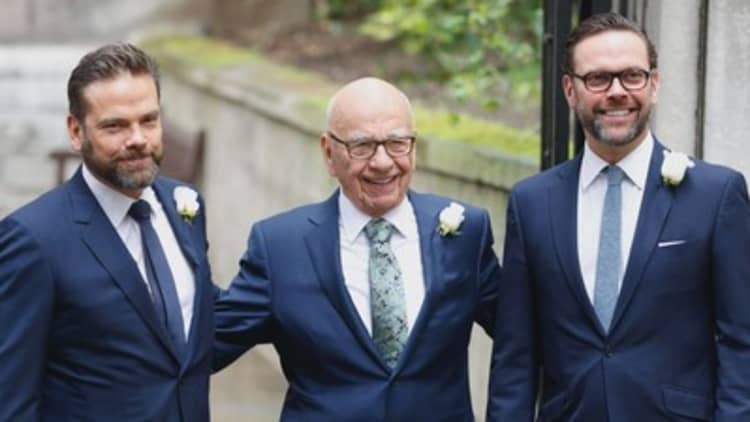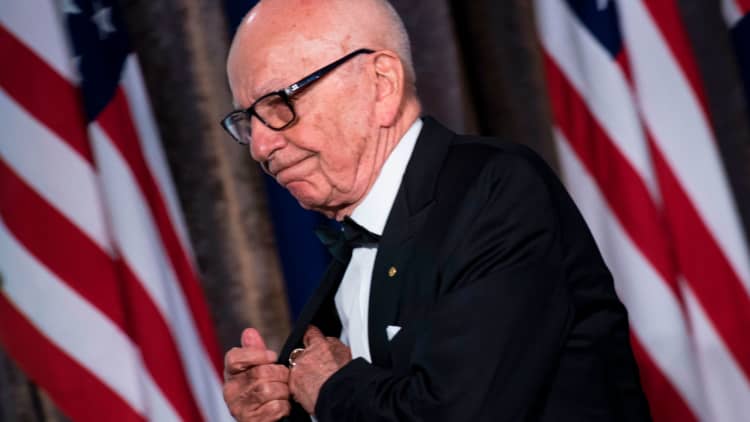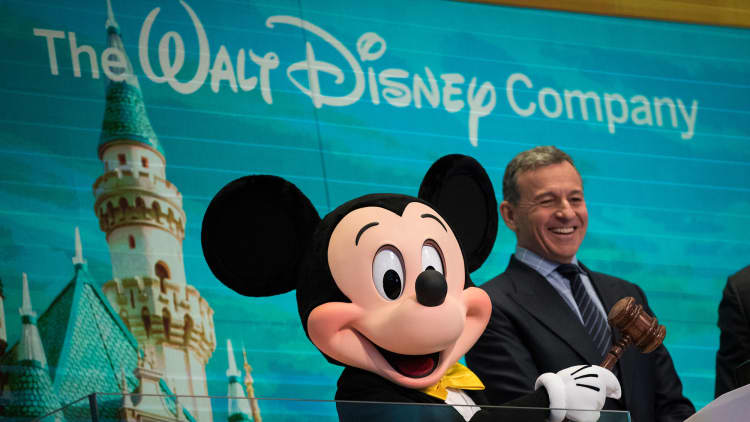
Twenty-First Century Fox's decision to sell $52 billion of assets to Disney seems like odd timing.
On the surface, Fox may have benefited by waiting until a federal judge rules on AT&T's $85 billion deal for Time Warner. That trial date is set for March 19, although a verdict may not come until about two months later.
Waiting would have let Fox know if big media vertical integration is acceptable under U.S. law or not. If it is — and AT&T's deal for Time Warner stands — Comcast and Verizon, both of which expressed interest in Fox's assets, would instantly become more viable buyers from a regulatory standpoint. That may have pushed Disney's offer price higher.
We should also remember that 3½ years ago Fox made an unsolicited offer to acquire Time Warner, then ultimately withdrew it. But Time Warner may be back in play in a few months, if the Department of Justice's decision to block AT&T's $85 billion acquisition holds up in court.

Such a decision would mean large telecommunications players are probably out of the running. A ruling against AT&T would seemingly eliminate Verizon or Comcast as buyers. Fox would jump to the top of the list of logical partners.
And yet, despite all this, Rupert Murdoch and his sons James and Lachlan are selling the majority of their media empire to Disney now, instead of waiting.
Here are several reasons why:
First: Disney's offer may have been exactly what the Murdochs wanted. Disney aggressively began talking to Fox in October on a deal, according to people familiar with the matter. Comcast, which expressed interest in Fox's assets later, actually publicly released a statement saying it "never got the level of engagement needed to make a definitive offer." That indicates Fox was content with Disney's bid and structure. While a board of directors has a duty to maximize shareholder value by running a fair sales process, the Murdochs own about 17 percent of Fox and control the company through voting shares.
Second: Vanity may be another reason why Fox is agreeing to a Disney deal, said Rich Greenfield, a media analyst at BTIG in New York who covers both Fox and Disney. The Murdochs would own about 5 percent of Disney if a deal is complete. While owning Comcast or Verizon shares may not be terrible, they don't come with the same international cache as Disney, Greenfield said.
"Who doesn't want to own a piece of Walt Disney?'' Greenfield said. "They've got the biggest studio in the world.''
Further, it's possible James Murdoch could ultimately succeed Chief Executive Officer Bob Iger at Disney, Greenfield said. Disney said Thursday Iger will remain chairman and CEO through 2021. Fox and Disney didn't specifically comment on James Murdoch's future role at either company.
Third: Fox no longer views a Time Warner merger as its most desirable outcome. In 2014, Fox viewed a deal for Time Warner as giving it the scale it needed. Now, a combined Fox-Time Warner still might not be big enough to compete against Netflix, Amazon Prime and other over-the-top services that have aggregated content supplemented with original series.
Disney has announced it is pulling its content away from Netflix and launching its own OTT product. Fox will own 25 percent of a post-deal Disney, giving it plenty of upside as it places its bets with Disney instead of Time Warner.
"The scale of what 'scale' is has changed in the last three years," said Eric Jackson, founder and president of EMJ Capital and a CNBC.com columnist. "Time Warner is a weaker company today than it was three years ago because Jeff Bewkes has run it to maximize its sale price for the past few years. It's not as able to compete internationally."
Fourth: Disney is still the best bet to win regulatory approval. Even if AT&T's deal for Time Warner stands, selling to Comcast may still not fly for Fox. The Trump administration has already made comments suggesting Comcast's deal for NBCUniversal shouldn't have been approved. Disney, which doesn't own cable distribution, may be a more palatable buyer for the Federal Communications Commission and Department of Justice.
'Not a slam dunk'
Regardless, Disney will have to jump through some major regulatory hurdles to get a deal done.
Disney will add to its domination of TV sports rights by acquiring Fox's regional sports networks and Fox's stake in Sky, which owns European soccer rights.The deal will also make the world's largest movie studio even bigger by merging with 20th Century Fox.
"This is not a slam dunk,'' Greenfield said.
"We know that a deal of this nature and of this size is going to receive a significant amount of regulatory scrutiny," Iger said in an interview with CNBC on Thursday. Disney would pay a $2.5 billion reverse breakup fee if the deal is stopped by regulators.
The wild card could be a hostile offer from a rival bidder while the Disney-Fox deal awaits approval from regulators and shareholders. If AT&T's acquisition of Time Warner holds up in court, Comcast could decide it has a chance to make a once-in-a-lifetime acquisition of a large production studio and influential international content assets, including a stake in the European satellite service Sky and the Indian cable network Star.
Comcast hasn't shied away from hostile offers in the past. In fact, Comcast CEO Brian Roberts made an unsuccessful hostile bid for Disney in 2004. A Comcast spokeswoman declined to comment.
Each side would receive a fee of about $1.5 billion if either terminates the deal for a superior offer.
While hostile bids for already-agreed upon deals are difficult, the Disney deal does require a shareholder vote, and depending on provisions, the Murdochs may only be able to vote their economic ownership instead of their super-voting shares. A counterbid isn't out of the realm of possibility, Greenfield said.
"Fox did not want to engage with Comcast,'' Greenfield said. "To me that's crazy.''
What happens to the rest of Fox?
If present-day cable media is all about scale, Fox isn't doing itself a service by becoming smaller. The new Fox, which will contain the broadcast network, its owned-and-operated affiliates, Fox News, Fox Business Channel, and Fox Sports 1, seems like a media company in desperate need of another deal.
One option is for the Murdochs to re-merge the company with News Corp, which owns assets including The Wall Street Journal and the New York Post. News Corp split into two companies in 2013.
Rupert Murdoch, on an investor call Thursday, said: "We haven't thought about combining [new Fox] with News Corp. If we do, it is way into the future."
Another possibility, if a Disney deal gets completed, is for the Murdochs to take the much-smaller Fox private. In fact, merging with News Corp and taking the entire thing private could be the most likely scenario, said Jackson.
Disclosure: Comcast owns CNBC parent NBCUniversal.
WATCH: Disney-Fox deal terrifying Hollywood, says expert



